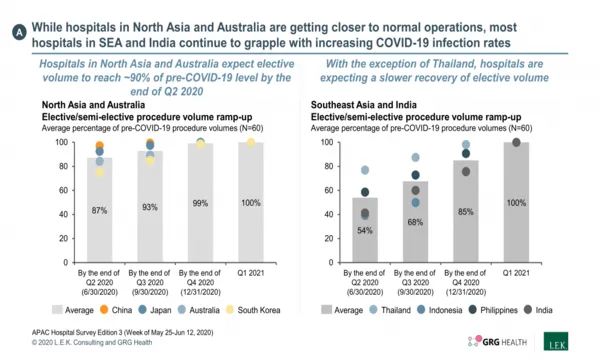
APAC hospitals seeing quick recovery from COVID-19 impact: survey
Inpatient capacity and procedure volumes expected to be within pre-COVID-19 levels this year.
A majority of hospitals in China, Japan, South Korea, and Australia were expecting to redeem their pre-COVID-19 elective/semi-elective procedure volumes by the end of Q2, whilst hospitals in Indonesia, Philippines, and India will reach the same level by the end of this quarter, a new survey of 225 Asia Pacific hospitals, by LEK Consulting and GRG Health, has found.
More than half of the respondents in North Asia and Australia have said that they are prepared to restart the procedures with all the necessary protocols, tools, and supplies. Between 50% and 60% of them are considering cardiac/structural heart, neurosurgery, and spine elective procedures as their highest priorities to restart. Whereas, around two-thirds of the respondents in Southeast Asia and India projected at least some delay, indicating a lack of preparedness in terms of PPE, testing supplies, protocols, and tools. The growing number of backlogged cases are also expected to add further to this delay.
The survey has found variable COVID-19 impact on inpatient capacity across the APAC region. The pandemic had very little impact on hospital’s inpatient capacity in Japan and China, whilst Thailand and Australia are now observing improvements. The impact was severe on hospitals in South Korea, Philippines, Indonesia, and India, although South Korea is expected to see minimal capacity impact in the upcoming two weeks, along with China, Japan, Thailand, and Australia.
To return to normalcy, 70% to 80% of respondents are forecasting significant investments in infection prevention, and over 40% are expecting to increase clinical staffing. In this situation, they are counting on the manufacturers to provide assistance in managing supply risk and take greater control over product delivery.


















 Advertise
Advertise


